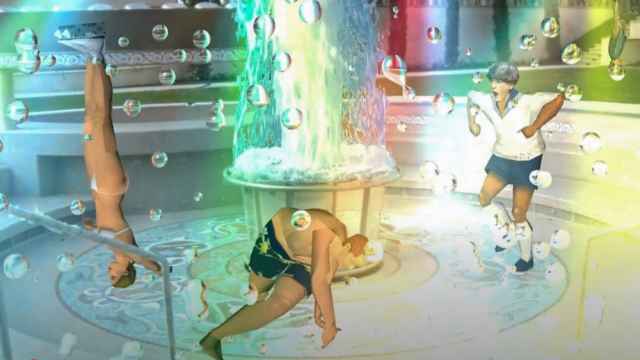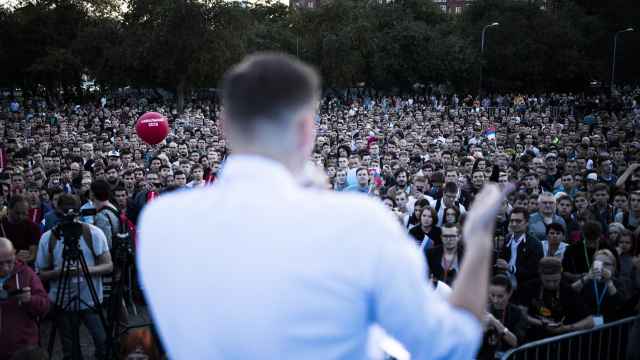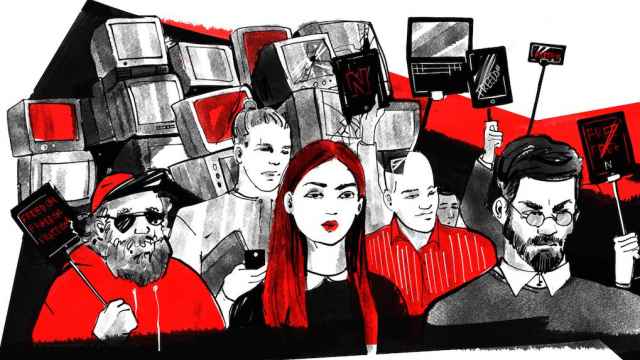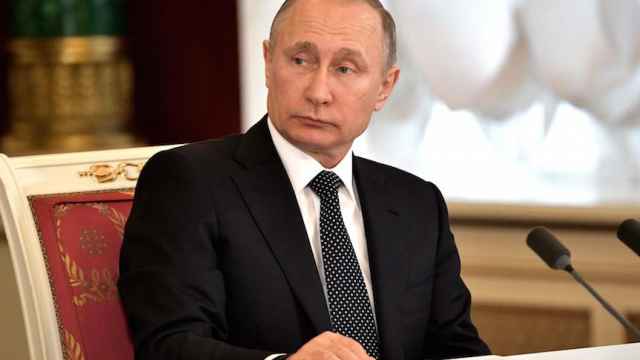Blue underwear and toilet brushes, snowball barrages and snow graffiti — Russia's protest movement in support of jailed Kremlin critic Alexei Navalny has seen demonstrators get creative.
Here's a rundown of the unusual memes and symbols from recent anti-government rallies and what they mean.
Blue underwear
Since December Russian protesters have hung blue boxer shorts on street signs, posted pictures clad in just blue underwear and held them at protests to show how the country's best-known opposition figure claims he was poisoned.
Navalny, who suffered an attack with the Novichok nerve agent in August, says agents from the Federal Security Service (FSB) placed the toxin in the lining of his blue underwear.
When President Vladimir Putin marked the Orthodox ritual celebrating the baptism of Jesus Christ this month by dunking himself in ice-cold water wearing blue swimming trunks, Navalny's allies joked that Putin was sporting his top opponent's undergarments.
Toilet brushes
After spending five months in Germany recovering from the poisoning, Navalny returned to Russia this month and was immediately detained.
The 44-year-old anti-corruption campaigner called for mass rallies, spurring on the protests by releasing an investigation into a lavish property on Russia's Black Sea coast that he alleged is owned by Putin.
The complex, which Navalny says cost more than $1.35 billion, allegedly features everything from an underground ice rink to a casino.
But what stuck out to the Russian opposition was the reported cost of a high-end toilet brush: 700 euros ($619). Several protesters brought what appeared to be considerably cheaper versions to last weekend's rallies.
Snow tools
At the demonstrations in Moscow, protesters pelted riot police and even a car that reportedly belonged to the FSB with snowballs.
They also wrote their demands, including "Free Navalny," on a snow-covered wall, which a police officer was filmed immediately wiping away.
But the action at times grew violent, with protesters cracking a window of the reported FSB car and the TASS news agency reporting that snowball throwers damaged the driver's eyesight.
Investigators have since opened 21 criminal cases in connection with the rallies, including probes into violence against law enforcement officials.
Four people nationwide were detained for building snowmen that held signs with political slogans, including "Freedom. Truth. Russia" and "Down with the Tsar".
Protest anthems
Many of the demonstrators expected they would face consequences for attending the rallies, which saw more than 4,000 people detained nationwide.
On TikTok, the video-sharing app popular with teenagers, users shared posts preparing for the protests with a song featuring the lyrics: "I will get jailed."
With protests planned this weekend, demonstrators have kept their spirits up with up tempo tunes.
One doing the rounds features another detail from Navalny's "Putin palace" report: a room from leaked architectural blueprints of the property and called the akvadiskoteka, or aquatic disco.
Protesters played the most popular rendition of the song at the rallies last weekend. And they have taken to calling others to join this weekend's planned demonstrations by referring to them with a euphemism: aquatic disco parties.
A Message from The Moscow Times:
Dear readers,
We are facing unprecedented challenges. Russia's Prosecutor General's Office has designated The Moscow Times as an "undesirable" organization, criminalizing our work and putting our staff at risk of prosecution. This follows our earlier unjust labeling as a "foreign agent."
These actions are direct attempts to silence independent journalism in Russia. The authorities claim our work "discredits the decisions of the Russian leadership." We see things differently: we strive to provide accurate, unbiased reporting on Russia.
We, the journalists of The Moscow Times, refuse to be silenced. But to continue our work, we need your help.
Your support, no matter how small, makes a world of difference. If you can, please support us monthly starting from just $2. It's quick to set up, and every contribution makes a significant impact.
By supporting The Moscow Times, you're defending open, independent journalism in the face of repression. Thank you for standing with us.
Remind me later.






